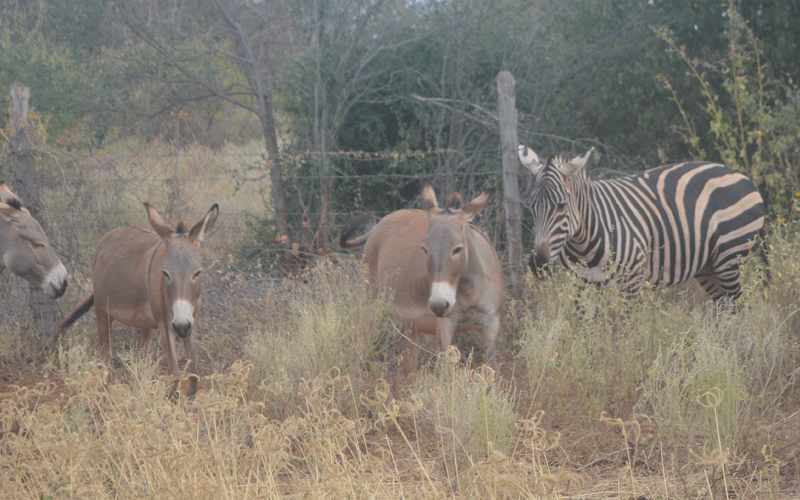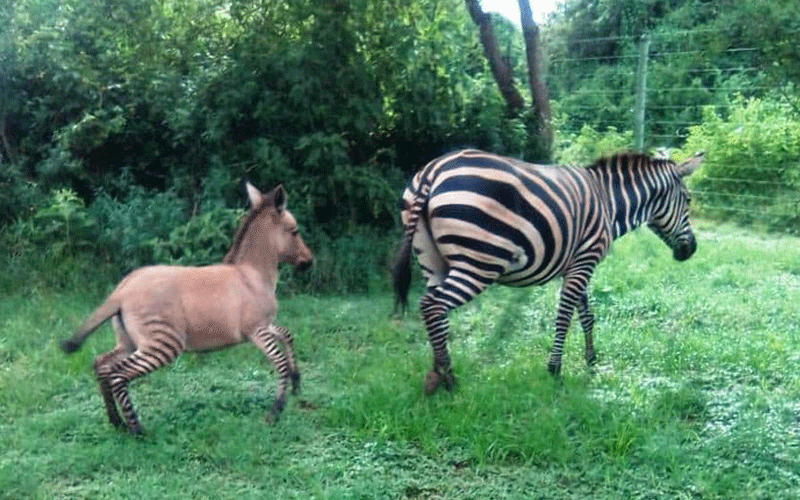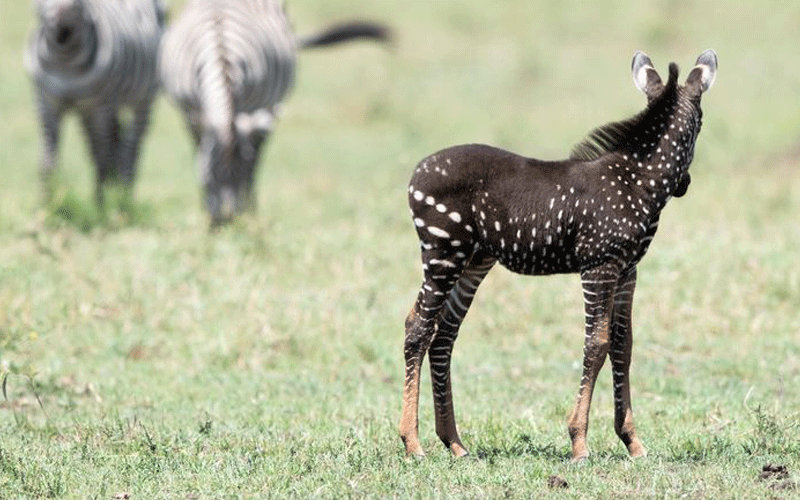Meet Kelitu, the zebra that birthed a zonkey

When we visited the farmer in April last year in Kitui county, we found the mare nicknamed Kelitu grazing peacefully with donkeys
Harriet James and Simon Nthusi
Standing tall and weighing nearly 300kg, the zebra nicknamed Kelitu (young girl in Kikamba) must have been intimidating at first to the young male donkeys in Masengo Malusi’s farm in Kitui south.
Male donkeys (called jacks) on average weigh 180 to 225kg and stand 92 to 123cm high at the shoulders.
In contrast, the common plains zebra stands 120 to 150cm at the shoulders and can weigh up to 350kg, with males being slightly bigger than females.
But love has no bounds. After lodging ‘illegally’ in farmer Masengo’s homestead for nearly two years, one of the jacks must have gained the courage and mated with Kelitu.
We know because a zonkey (a cross between a zebra and a donkey) has been born at Chyulu Hills National Park, where Kelitu was transferred in May last year by KWS rangers.
This was after the farmer complained the zebra ate too much fodder, drunk too much water and grazed in his neighbour’s farms.
Sheldrick Wildlife Trust, an animal rescue and rehabilitation organisation, which usually takes care of baby elephants, rhinos and sometimes-orphaned zebras and KWS transferred her to the park, where she gave birth.
Tsavo Park
The peculiar foal has stripes just like a zebra but they aren’t dark and barely cover her body. She was discovered by the caregivers at the Sheldrick Wildlife Trust, who examined the foal up close and discovered that it wasn’t a zebra but a zonkey.

PD/Simon Nthusi
“Working with wildlife, one learns to expect the unexpected. A seemingly straightforward story can eventually reveal its true stripes and end up surprising us all,” the organisation said in a statement.
A zonkey combines the sturdy body of its donkey sire and the striped legs of its zebra mother, which makes for a striking creature.
“While it should otherwise lead a normal life, zonkeys are mules, meaning that it will be unable to successfully breed once it reaches maturity,” the Trust regretted.
The zebra strayed out of the Tsavo East National Park three years ago into the community where she settled in Masengo’s boma.
When we visited the farmer in April last year in Kisiio village, Mutomo sub-county, at the foot of Yatta plateau along Kibwezi- Kitui highway 45km from Mombasa highway, we found the mare grazing peacefully with the asses.
“The zebra came running, but when it arrived where our three donkeys were tethered, it stopped and joined them.
This was late 2017. We thought it was just passing by, but it stayed there, feeding with the donkeys till night fall,” said Mwende, Masengo’s wife.
At first it drew much attention from the neighbours and passers-by who termed it a ghost.
“Then they stopped visiting us. I had no peace, people would gossip that we should be avoided. I lost many friends,” she said.
The zebra was was not friendly and drawing near it wasn’t an easy thing, but with time, it learnt that the couple meant well.
“At first it would bolt into the bush whenever we went near it only to return later at night.
Today, she has learnt to tolerate us, although you can’t tie it up like a cow. We just let it roam,” she added.
Destructive animal
The family contacted KWS personnel and notified them of the zebra’s presence at their home many times, but no action was taken. They only came and took pictures, she said.

Photo/PD/Courtesy
To make money, the family sought KWS help in domesticating Kaiitu further to attract tourists. They also considered using her to plough their shamba or to fetch water.
Interesting, the mare showed no signs of mating with the donkey then due to its huge size compared to the jacks.
“We have paid thousands of shillingds in compensation after Kelitu and my donkeys strayed to our neighbours’ irrigated farms, destroying fences and eating crops,” Masengo said.
Worse, the zebra left the entire village dry since no fence could deter it from crossing, it jumps off fences.
“The mare is more destructive than cows or donkeys; it feeds all day long and drinks on avarage 20 litres of water daily,” he regets.Who will ever compensate him?












